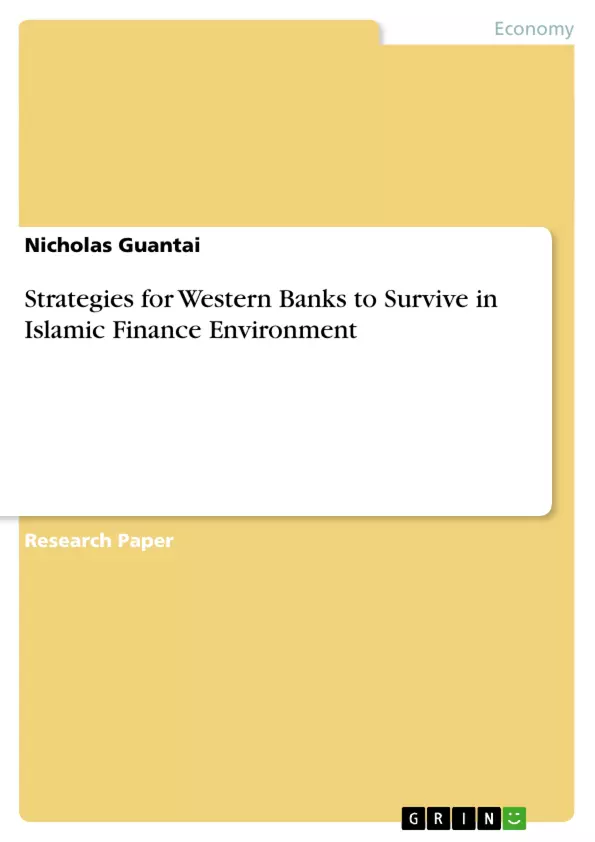The current rapid growth rate of Islamic banking in the world market has made the banking approach a significant contributor to economic growth. However, few studies have been done to determine the extent to which conventional banks can survive in an Islamic banking environment. The purpose of this study was to assess the financial performance of financial institutions and relate it to their involvement in Islamic banking.
The study took an explorative and a quantitative approach, whereby literature was acquired from online sources for use in assessing the current state of knowledge, and financial performance data for Citigroup, Deutsche Bank, HSBC, Morgan Stanley and Goldman Sachs were acquired from Bloomberg BusinessWeek. The literature was reviewed in the literature review section while financial performance records were assessed using Microsoft Excel 2011 software package.
The study findings determined that conventional banks have varying degrees of success in their Islamic banking ventures, whereby high levels of fluctuations characterize the institutions’ financial records. According to the exponential growth of Goldman Sachs in 2012 upon the issuance of sukuks, it is relatively easy for conventional banks to achieve growth through offering of Islamic banking products. However, according to the study findings, Islamic banking is not suitable for banks that want to achieve consistency in exponential growth, but is highly relevant for institutions that want to remain stable in their financial performance despite changes in market conditions.
Inhaltsverzeichnis (Table of Contents)
- Introduction
- Background
- Principles of Sharia Banking
- Advantages of Islamic Banking
- Shortcomings of Islamic Banking
- Statement of the Problem
- Significance of the Study
- Research Questions
- Synthesis
- Literature Review
- Principles of Islamic Banking
- Benefits of Islamic Banking
- Challenges to Islamic Banking
- Comparison of Islamic Banking with Conventional Banking
- Factors that Affect Success in Islamic Banking
- Criticism against Islamic Banking
- Summary
- Research Methods
- Findings and Discussion
- Synthesis
- Conclusion
Zielsetzung und Themenschwerpunkte (Objectives and Key Themes)
The study aims to evaluate the impact of Islamic banking on the financial performance of conventional banks in a Western market environment. It analyzes available literature and financial data from leading institutions to determine the positive or negative outcomes of Islamic banking for these businesses.
- The feasibility of Islamic banking in a Western market.
- The impact of Islamic banking on conventional bank profitability.
- The relationship between investment in Islamic banking and financial performance.
- The challenges and opportunities associated with Islamic banking in a Western context.
- The role of Sharia compliance and risk-sharing in Islamic banking.
Zusammenfassung der Kapitel (Chapter Summaries)
The study analyzes the principles and practices of Islamic banking, highlighting its key features like the prohibition of interest, risk-sharing, and ethical principles. It explores the advantages of Islamic banking, including its ethical foundation, customer participation, and potential for stable growth, while also acknowledging the challenges, such as regulatory issues, the complex nature of Sharia compliance, and the potential for lower returns. The study analyzes the financial performance of five major international banks – Citigroup, Deutsche Bank, HSBC, Morgan Stanley, and Goldman Sachs – that have ventured into Islamic banking, assessing their growth rates and profitability.
Schlüsselwörter (Keywords)
The primary keywords and focus topics of this work include Islamic banking, conventional banking, Sharia, risk-sharing, profitability, financial performance, Western market, regulatory challenges, customer loyalty, growth trends, and case studies of major international banks.
Frequently Asked Questions
Can Western banks successfully participate in Islamic Finance?
Yes, the study shows that major banks like Citigroup, HSBC, and Deutsche Bank have implemented Islamic banking ventures with varying degrees of success and stability.
What are the core principles of Islamic Banking (Sharia Banking)?
The main principles include the prohibition of interest (riba), risk-sharing, ethical investments, and the avoidance of gambling or uncertainty.
What are the advantages of Islamic Banking for conventional banks?
It offers access to growing markets, increases financial stability during market fluctuations, and attracts customers looking for ethical and risk-sharing financial products.
What are "Sukuks"?
Sukuks are Islamic financial certificates, similar to bonds, that comply with Sharia law by providing ownership in an underlying asset rather than interest-bearing debt.
Is Islamic banking suitable for high exponential growth?
The study suggests it is highly relevant for institutions seeking stability, though it may not always provide the consistent exponential growth seen in conventional aggressive banking models.
- Citation du texte
- Nicholas Guantai (Auteur), 2013, Strategies for Western Banks to Survive in Islamic Finance Environment, Munich, GRIN Verlag, https://www.grin.com/document/215171



